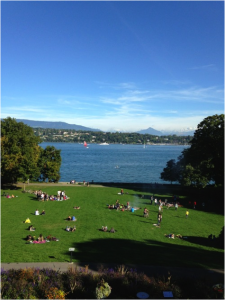10 reasons to visit… Geneva
When I tell people that I lived in Geneva for five months during my Erasmus year, most say ‘Geneva, yeah…I’ve been to the airport,’ and I have to confess that I was once amongst them. The city as far as I was concerned was a necessary stop on the way towards my most adored pastime (snowboarding), and little else. Although not high up on most students’ list of places to spend a considerable amount of time, due to its costliness and largely conservative culture, I managed to find a host of affordable enjoyments in which you can partake, if ever stuck on a flight transfer or, you know, you actually decide to visit.
Switzerland has three official languages – French, German and Italian. The language predominantly spoken in Geneva is French – don’t forget to learn a little before you go…
1. Lac Léman (pronounced “lemon” in a French-sounding accent)
A beautiful body of water 73km long that is flanked by the Jura mountains to the North and the Alps to the South. On a clear, crisp, winter’s day you can see the snowy summit of breath-taking Mont Blanc, which I can assure you, is the best cure for any heaviness of heart. If you buy a transport pass, it includes trips from one side to the other (at the narrower, city end) – just imagine if that were your daily commute! The lake is great for running around, swimming in and looking at from a variety of locations. Parks worth a visit along the banks are: ‘Mon Repos’ and the ‘Jardin Botanique’ on the Rive Gauche, or ‘La Grange’ on the Rive Droite.
2. Buvette des Bains des Pâquis, Quai du Mont Blanc
It is here that you can combine two of the most Swiss of pastimes: the eating of fondue, by a lake. Although the summer menu doesn’t offer this cheese and wine based delight, the atmosphere of the place is still something to enjoy. If you don’t fancy eating, you can also indulge in a Hammam or massage, or depending on how brave you’re feeling, jump straight in the lake. I went in in December, which I would highly recommend!
3. The ‘brocante’ at Plaine de Plainpalais
Every Wednesday and Saturday, and every first Sunday of the month, the Plaine de Plainpalais holds one of Switzerland’s largest flea markets. From old postcards to candelabras, fur coats to vintage skis, treasures abound. Food stalls selling many different international delights of various savoury and sweet description, and you could easily spend a whole morning trawling through the crates of CDs and photographs. Bargain brocante hunting!
4. The Palais de Nations
The UN offer tours in 15 different languages, through the hallways and into the conference rooms where the world’s wrongs are put to rights. The complex is centred around President Woodrow Wilson’s ‘League of Nations’ building from the 1920s, and the view out onto the lake is in itself pretty inspiring. All in all, a worthwhile experience.
5. International Red Cross and Crescent Museum
The Red Cross was founded in Geneva in 1863 with a view to offering support and relief to wounded soldiers. Since then, the organisation has grown to protect victims of international and domestic conflict. This museum was harrowing and heart-warming at the same time, with so many first-person sources, and an impressive interactive learning facility.
6. Proximity to ski resorts
Ok, arguably this isn’t a reason to visit Geneva, but it’s definitely something that’s great about the city. There are 23 resorts within an hour’s drive, making a weekend break in the mountains a perfectly viable option. If you’re wanting to go further afield, many companies run regular bus services from the airport, which is only a ten-minute efficiently-run Swiss train ride away from the centre.
7. Cathédrale St. Pierre
Situated on the hill of the beautiful old town of Geneva, this Cathedral has a spectacular panoramic view of the city and the mountains that lie beyond. The cathedral itself is an impressive structure, and inside lies the chair of Jean Calvin, one of the pivotal figures of the 16th century Protestant Reformation.
8. CERN
Whilst living in Geneva, I was lucky enough to attend a CERN open day and it thoroughly amazed and confused me. The European Centre for Nuclear Research is a complicated network of warehouses and research buildings that give the appearance of a large village, oh, and there’s a 27km underground Large Hadron Collider too. The visit was more science than I have learnt in my whole life, squished into an afternoon, and I left frazzled but fascinated!
9. Ice Hockey
I will confess that I was already an ice hockey fan before moving to Geneva, but watching Genève Servette play really entrenched my love for the sport. The atmosphere at a game is instantly electric because not only are the fans excited, but also cold, so everyone shouts and jumps right from the get go. The team are definitely worth watching too – this last season they made it to the semi-final of the Swiss National Championships where they had to play ZSC Lions seven times, and unfortunately lost out on a finals place only in the last game.
10. Carouge
This little market town, south of the city, is full of boutiques and hosts a variety of themed markets throughout the year. There are the regular stalls selling meat, cheese, fruit and veg, but it’s worth going at Christmas time to get a sense of the community. Another favourite was when I was there in October and they had a sheep-shearing demonstration and a petting zoo, complete with a show where a sheepdog herded some geese. #Switzerweird
Have you been to Geneva? Share your own reasons to visit in the comments – and remember, we’re always open to suggestions for new places to feature!
Lucy
Quote of the week: 19 Jul 2014
For more like this, find us on Pinterest.
Embed This Image On Your Site (copy code below):
Che dice la nostra cultura quotidiana di noi?
Today we’re excited to share our first ever bilingual post, written by Lucy, who’s just returned from four months in Rome as part of her university studies. In this post, she talks about a few typical Italian habits she noticed during her time in the city and some of the (slightly surprising) questions she had to answer about British culture.
Don’t speak Italian? There’s an English translation below. And if you’d like to join the conversation, you can do so in the comments or on Twitter – see the end of the post for details.
Benché esistano delle centinaia di diverse abitudini italiane, dal nord al sud, dalle montagne alle coste, almeno si trova una percettibile concordanza di “modi di fare” di base che abbraccia il paese: si mangia la pasta ogni giorno, si offre l’opinione se richiesto o non, e non si telefona mai durante l’ora di pranzo (entro le 1300 e le 1500). Non essendo italiana me stessa, trovavo un po’ strano queste regole seguite persino dai giovani come se fossero ordinate dal Papa. Era solo quando mi sono resa conto che sono imposte invece dalle matriarche che iniziavo a capire le sue importanza. C’è una convivialità e un autentico rispetto per il comportamento che insieme danno un metodo alla follia.
Cercavo di integrarmi bene e cordialmente in queste situazioni, e mi piaceva molto imparare questi “si fa” e “non si fa”. Gradualmente mi abituavo a tenere lo sguardo durante il brindisi, a rivolgermi ai vecchi con “Lei” e non “tu”, e di avere pazienza quando facendo una fila perché non si sa mai quanto lungo sarebbe.
Una delle gioie dell’anno Erasmus e che s’incontra delle persone non solo da diversi paesi ma di varie origini, e si tocca di spiegare le sue proprie radici. Qualche volta è più difficile che abbia mai pensato. Vi lascio una manciata di domande che mi capitavo di rispondere durante le 4 mesi che ho passato in Italia:
Perché gli inglesi mettono la moquette dappertutto nelle case, e poi mettono sopra i tappetti?
Questo mi ha sorpreso perché mi chiedevo quasi ogni giorno il ragionamento dietro la mancanza della moquette nell’appartamento che stavo affittando. Storicamente indovino che fu una mostra di stravaganza perché gli sconti per pulirla dovettero essere esorbitanti. Potrebbe essere anche per aggiungere un po’ di calore nelle stanze.
Perché non apprezzate il vino invece di berlo troppo a causa dei giochi di bevanda?
Sono consapevole della riputazione che noi inglesi abbiamo per l’abuso dell’alcool, e a dire la verità, mi vergogna di questo nostro status mondiale. Pero, difendo questa cultura solo un’iota per porre che almeno non abbiamo paura di essere scemi, e questa propensità gli italiani si manca.
E la pioggia…?
Gli italiani che incontro sembrano di avere una vera inquietudine per la mia salute quando imparano che piove più di una volta alla settimana in Gran Bretagna, anche durante l’estate. Ho anche qualche amico italiano che ha sinceramente basato le scelte di università sul clima. Quando si viene da un paese dove il sole brilla nell’estate e la neve cade nell’inverno, scommetto che sarebbe difficile immaginare qualsiasi altra realtà, ancora meno la timorosa pioggia!
Alla fine del mio soggiorno in Italia, avevo la sicurezza di dare direzioni a una taxista con attenzione risoluta, e di rifiutare con cortesia le proposizioni di una vecchia sull’autobus di una cena con la sua nipote (chi tra l’altro sta studiando per diventare medico). Pero, al momento in cui qualcuno mi dà un pezzo di frutta, non sarò mai in grado di mangiarla con le posate, mi dispiace. Certe consuetudini naturalmente resteranno per sempre entro il paese, ma vi consiglio, ansi vi sfido di immergetevi nella cultura italiana e di imparare qualche maniera nuova – vi prometto che vi farà sorridere!
Avete scoperto un’abitudine intrinsecamente italiana che vi è piaciuto mentre stavate in Italia? Condividerlo con noi, lasciando un commento, oppure su Twitter @EuroTalk #abitudineitaliana
What does our everyday culture say about us?
Although there are hundreds of Italian mannerisms, from north to south, whether in the mountains or at the coast, there is a distinguishable way of doing things that brings the country together: they eat pasta every day, they offer their opinion whether asked for or not, and they never phone anyone at lunchtime (1pm-3pm). Not being Italian myself, I found these rules, followed by young and old alike as if handed down by the Pope, a little difficult at first. It was only when I realised that they were actually imposed by the head of the family (the matriarch) that I began to understand their importance. This culture of conviviality, backed by a genuine respect for courtesy, offers a method to the madness.
I tried my best to integrate myself in these situations, and I really enjoyed learning the “do’s” and “don’ts”. Gradually I got used to looking someone sternly in the eye whilst clinking glasses for a toast, to using the third person singular when addressing someone older than me, and to keeping my patience when queuing for anything, because you can never know how long you’ll be waiting.
One of the many joys of an Erasmus year is that you meet people who are not only from different countries but varied backgrounds, which means you are also tasked with explaining the reason to your rhyme. This is often harder than you’d have ever thought. Here are a few questions that I had to reply to during my four months in Italy:
Why do English people put carpet everywhere in the house, and then put rugs on top?
This question really surprised me because I’d been wondering why there wasn’t any carpet to be seen in the apartment I was living in. I guess that historically, carpet was a demonstration of extravagance because the cost of cleaning them would have been extortionate. It could also be because carpet adds warmth to a room.
Why don’t English people appreciate wine instead of drinking too much of it (for example in drinking games)?
I’m aware of the reputation that us Brits have for abusing alcohol and to tell you the truth, our world-renowned status is embarrassing. However, I’ll defend our drinking culture just an iota by proffering that at least we’re not afraid of looking a bit silly every once in a while, which is a propensity that Italians seem to lack.
And what about the rain…?
Italians that I have met seem genuinely worried for my health when they learn that it often rains more than once a week in the UK, even in the summer. I have a couple of Italian friends who have even based their university choices on the weather. I guess when you come from a country where the sun shines in the summer and the snow falls in the winter, it’s would be pretty difficult to imagine anything different, much less the infamous rain!
At the end of my stay in Italy, I had acquired the confidence to give firm directions to a taxi driver, and to politely decline offers from old ladies on the bus to have their grandson (who as it happens studies medicine) take me out to dinner. However, I’m afraid to say that if someone were to hand me a piece of fruit, I still wouldn’t ever be able to eat it with a knife and fork. Some customs will obviously stay forever within a country, but I recommend or even challenge you to immerse yourself in Italian culture and to learn a new quirk – I promise it’ll make you smile!
Have you discovered any fun intrinsically Italian habits? Share them with us by leaving a comment, or on Twitter @EuroTalk #abitudineitaliana
Lucy
Learning Mandarin: Never call your mother a horse, and other tips
Cameron’s spending a couple of weeks with us here at EuroTalk for work experience. In today’s blog post, he explains why he chose to learn one of the world’s most difficult languages, and gives his suggestions for anyone who’s thinking about taking up the challenge.
Are you learning Mandarin? What drew you to the language? And do you have any tips of your own to share?
 Mandarin is recognised as one of the hardest languages to learn in the world, but with great difficulty comes great reward, as Mandarin is also one of the most useful languages in the world. Mandarin is so useful because it is spoken by almost 15 percent of the earth’s population natively, which is almost 1 billion people, and this figure does not include non-native speakers like myself. Also, China is one of the economic and industrial giants of the 21st century, and it’s still growing. Therefore Mandarin is very useful if you want to do business with the people involved in the global superpower that is China. As well as the practical reasons, Mandarin is also a great language to learn for cultural reasons, because, as you probably know, when learning any language, the culture of that country comes hand in hand, and China has a fascinating culture with a rich history.
Mandarin is recognised as one of the hardest languages to learn in the world, but with great difficulty comes great reward, as Mandarin is also one of the most useful languages in the world. Mandarin is so useful because it is spoken by almost 15 percent of the earth’s population natively, which is almost 1 billion people, and this figure does not include non-native speakers like myself. Also, China is one of the economic and industrial giants of the 21st century, and it’s still growing. Therefore Mandarin is very useful if you want to do business with the people involved in the global superpower that is China. As well as the practical reasons, Mandarin is also a great language to learn for cultural reasons, because, as you probably know, when learning any language, the culture of that country comes hand in hand, and China has a fascinating culture with a rich history.
Furthermore, if you learn Mandarin, that adds an extra incentive to make a trip to China to practise your newfound passion, and what’s a better way to spend your holidays than walking the great wall of China or paying a visit to the Terracotta Army? Additionally, if you’re the kind of person who relishes a new challenge, Mandarin is the perfect language for you, because, as I previously stated, it’s one of the hardest languages to learn in the world. On top of this, Mandarin will also appeal to you arty types out there in the form of calligraphy; this is a form of Chinese writing that involves painting the characters onto special paper called Xuanzhi (宣紙).
The most important thing to remember when learning Mandarin is not to get overwhelmed by the vast number of characters in the language; in fact I wouldn’t even worry about characters until you become more advanced in the language. Instead, begin by focusing on the oral side of the language, in particular, the pronunciation of words. In Mandarin pronunciation is key, for example, the word ‘ma’ can be said in four different ways and means four different things, so be careful not to call your mother a horse by pronouncing this word wrong!
A good thing to use to mark your progress of learning Mandarin is the HSK exams. These exams are held once a month and there are numerous different levels to work through, ranging from beginners exams to exams for people who are almost fluent, as well as the added bonus that they are recognised qualifications throughout China.
Good luck!
Cameron
If you’re interested in learning Mandarin, you can get started completely free with uTalk for iOS. Enjoy!
Quote of the week: 12 Jul 2014
“Everyone smiles in the same language.” George Carlin
For more like this, find us on Pinterest.
Embed This Image On Your Site (copy code below):






